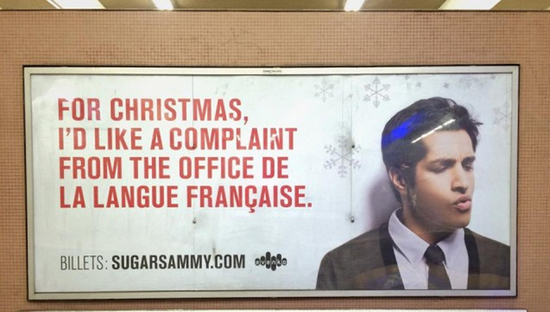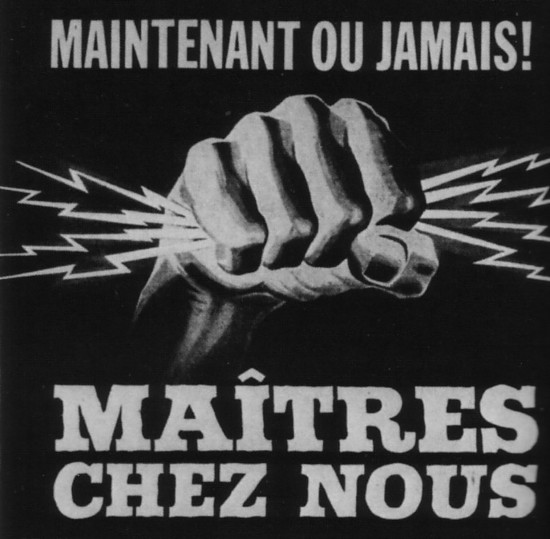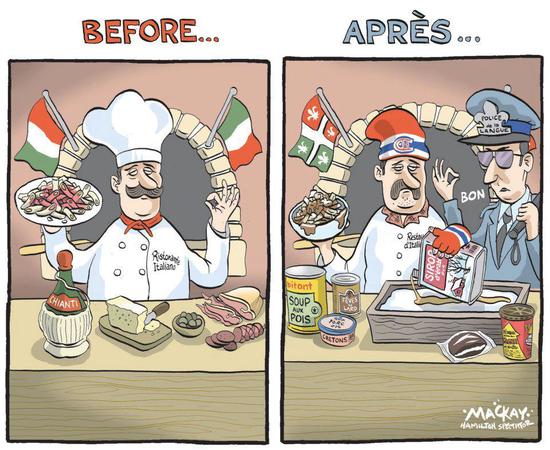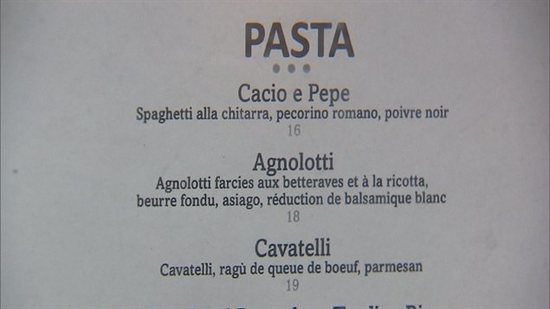Language has long been a contentious subject of debate in Quebec. Since the earliest days of British colonization, French Canadians have fervently resisted assimilation into the anglophone majority, which eventually gave birth to the nation's defining policy of official bilingualism whereby English and French have equal status in Canada. Despite the federal government's efforts to satisfy the linguistic needs of every citizen, the Quebec government saw it necessary to protect the language rights of Quebecers, as well as the integrity of the language itself. One such safeguard was establishing the Office québécois de la langue française which, over the years, has gained notoriety due to its perceived overzealous enforcement of Bill 101. The prevalence of such incidents has led many nowadays to believe that the OQLF has outlived its usefulness and relevance. To determine the reality of this attitude, the factors that gave rise to the Office must be weighed against its present role in Quebec society.
 Montreal native and comedian, Sugar Sammy, poking fun at the OQLF
Montreal native and comedian, Sugar Sammy, poking fun at the OQLF
Since its establishment in 1961 under the Liberal government of Jean Lesage, the OQLF has undertaken the mission to establish and maintain French as the official language of Quebec institutions and businesses. Under the Charter of the French Language (a.k.a. Bill 101), "the Office may, among other things, take any appropriate measure to promote French." Despite the Charter's apparent objective, it was generally understood that the Office's intended purpose was to minimize the use of English in Quebec, the predominant threat to "the instrument by which that people has articulated its identity." The strategy worked, and Quebec managed to take control of its domestic affairs and obtain a greater level of autonomy in society, government and economy (Maîtres chez nous as famously said by Lesage). This was thanks in part to the implicit requirement of Quebec residents to speak French, which led to a mass exodus of business-minded anglophones. Though they may have benefited from it in the past, not all French-speaking Quebecers favour the Office, and some even disagree with its redundant platform of protecting francophone interests.
 Jean Lesage's famous campaign slogan, "now or never...masters of our own house"
Jean Lesage's famous campaign slogan, "now or never...masters of our own house"
One individual of the latter opinion is Calvin Veltman, a linguistic demographer and former sociology professor at UQAM. According to his court testimony on the constitutional validity of Bill 101, "provincial demographers, civil servants, and politicians who promote the idea that French is threatened do so to push their own agendas, which in many cases can be the protection of their own jobs." Though his claim obviously calls into question the actions of the Office's employees, it may not be too far from the truth, seeing that security of the French language would entirely marginalize the Office's purpose, resulting in a mass layoff. It has been repeated ad nauseam that power corrupts, but the cliché rings especially true for the Office's detractors and victims, who perceive its actions as unconstitutional and arbitrary. From the outset of Quebec's struggle to become "masters of their house" to the present, public opinion of the Office has shifted from an organization dedicated to protecting the rights of French-speaking Quebecers to one abusing its authority to eliminate all external, non-French influences within Quebec.
 Newspaper comic satirizing the result of the OQLF's efforts
Newspaper comic satirizing the result of the OQLF's efforts
Montreal's very own Mordecai Richler was a staunch critic of the Office's policies and once even called the anglophone exodus a "gentile ethnic cleansing." In 1992, he authored Oh Canada! Oh Quebec! Requiem for a Divided Country, ridiculing what he considered "the western world's goofiest and most unnecessary political crisis," referring to Quebec's language laws. The book drew much controversy and strong criticism from Quebec nationalists, for whom Richler's words probably hit closer to home today than ever before. Pastagate, the incident that thrust the OQLF into the international spotlight in 2013, is regarded as a classic example of comical enforcement of fastidious language policy. Their attempt to change an Italian restaurant owner's menu to readpâtes instead of pasta was not only mocked by the world, but also caused much embarrassment to the ultra-sovereignist Marois government. This ultimately led to increased popular discontent against the Parti québécois and their eventual downfall. Nonetheless, OQLF inspectors are still on the beat today, scouring the city of the slightest language law infraction and dishing out irrelevant fines to offending businesses.
 The infamous menu that sparked the Pastagate controversy
The infamous menu that sparked the Pastagate controversy
To its credit, however, there's more to the Office than just language policing. In a similar vein to the French Academy, they also oversee the quality and propriety of the French language in Quebec, providing free resources such as Le grand dictionnaire terminologique and the Banque de dépannage linguistique, the Quebec equivalent of the Canadian government's TERMIUM Plus terminology and linguistic data bank. Considering the widespread use of Anglicisms in everyday Quebec French (j'ai scrapé mon winshil et mes flasheurs), this aspect of the OQLF's function seems reasonable and even necessary, not only for the sake of the people but for the survival of the language itself. After all, Montreal is the second largest French-speaking city in the world, only second to Paris.
Since its mandate by the Charter of the French Language in 1977, the Office québécois de la langue française has enforced the French-speaking majority's right to be "informed and served in French." In the process, however, it has inadvertently earned a worldwide reputation for antagonizing businesses over language matters of extreme inconsequentiality, and has further isolated Quebec from the rest of Canada through its policy of cultural preservation. What the future holds for the OQLF is uncertain, but only time will tell if Quebec's language situation sees a major enough détente to dissolve the organization.
Image sources:
http://bilan.usherbrooke.ca/voutes/voute3/maitrescheznousquebec_1962.jpg
http://i.imgur.com/dH5s6iX.jpg
http://img.src.ca/2013/02/21/635x357/130221_vm9b1_menu-buonanotte_sn635.jpg
http://upload.wikimedia.org/wikipedia/fr/thumb/e/e7/Oqlf_logo.svg/478px-Oqlf_logo.svg.png
http://www.infopresse.com/Uploads/images/Article/Body/sugar_sammy_bill1.jpg
Sources:
http://en.wikipedia.org/wiki/Mordecai_Richler
http://en.wikipedia.org/wiki/Office_québécois_de_la_langue_française
http://en.wikipedia.org/wiki/Oh_Canada!_Oh_Quebec!
http://en.wikipedia.org/wiki/Pastagate
http://montreal.ctvnews.ca/demographer-argues-oqlf-not-needed-because-french-is-not-threatened-1.1823421
http://www.oqlf.gouv.qc.ca/index.html
http://www2.publicationsduquebec.gouv.qc.ca/dynamicSearch/telecharge.php?type=2&file=/C_11/C11_A.html
https://www.youtube.com/watch?v=sxeQpGasEME (4:22 mark)

Very current topic and I enjoyed reading about the Pastagate controversy. Your Italian chef caricature was very funny also.